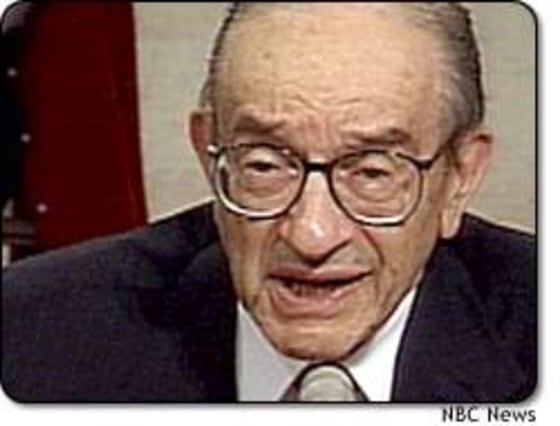Federal Reserve policy-makers meet Tuesday and likely will emphasize their intention to keep interest rates low for an extended period as the economy is still failing to create jobs despite signs of impressive strength in sales and productivity.
Fed Chairman Alan Greenspan and his colleagues are almost universally expected to keep short-term interest rates unchanged as they have since cutting them in June to their lowest levels in 45 years. And the Fed likely will offer only cautious optimism about the economy with their enthusiasm tempered by the latest frustrating signs on the labor front.
The Fed has every reason to stay relatively muted about the economy’s rebound for fear of unintentionally sparking another bond market sell-off that would drive interest rates higher. That was what happened in June when bond traders were confused by what many saw as conflicting signals about the potential for deflation, or widespread falling prices.
When the Fed cut its benchmark overnight rate on June 25 by a quarter-percentage point rather than the half-point many traders had expected, bond prices began falling rapidly, sending long-term interest rates up sharply, including mortgage rates.
In recent weeks, long-term interest rates have fallen back, partly because of comments by Fed Gov. Ben Bernanke stressing that he still sees falling inflation as a threat. “for now it seems to me that, with inflation already low, disinflation risk will remain a concern for some time,” he said in a Sept. 4 speech.
He also said that the Fed might even have to cut short-term rates further if the economy slows and labor markets remain “soft.”
Jade Zelnick, chief economist at Greenwich Capital Markets, said Fed officials likely are pleased that long-term rates have come back down to what she called “a more reasonable level.”
“From a market standpoint the last thing the Fed wants is to see market rates back up,” she said. “They would be very hesitant to rock the boat at this point.”
After an eight-month recession in 2001, the economy has grown in fits and starts, frustrating policy-makers and investors. But in recent weeks there have been growing signs that the economy at last is responding to massive stimulus including the latest round of federal tax cuts and 13 cuts in the benchmark short-term interest rate by the Fed beginning in January 2001.
A survey of business economists released Monday showed that forecasters now expect the economy to grow at a 4 percent pace next year and 2.6 percent this year, up significantly from the last survey released four months ago. The survey by the National Association for Business Economics also sees the unemployment rate dropping to 5.8 percent by the end of 2004 from the current 6.1 percent.
Recent economic data have been mostly positive, including a report that retail sales rose in August for a fourth straight month, boosted by lower federal withholding rates and $13 billion in child tax credit payments mailed to taxpayers in July and August. The long-battered manufacturing sector also has shown signs of life with steady growth in orders and production.
Some analysts forecast the economy could grow at a rate of more than 5 percent in the current quarter, which would be its best showing since the 1999 heyday of the dot-com boom.
But the Fed likely also will point to the latest disappointing data on employment, including new claims for unemployment benefits, which have risen for the past three weeks. The economy lost an estimated 93,000 jobs in August, a seventh straight month of losses and a major disappointment after many forecasters projected the number finally would turn positive.
